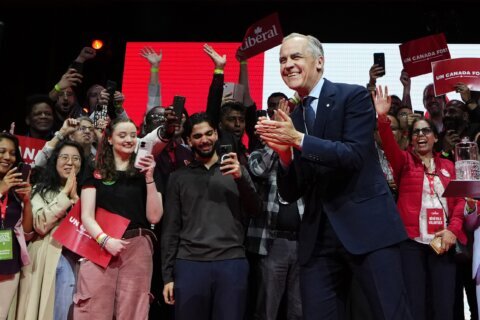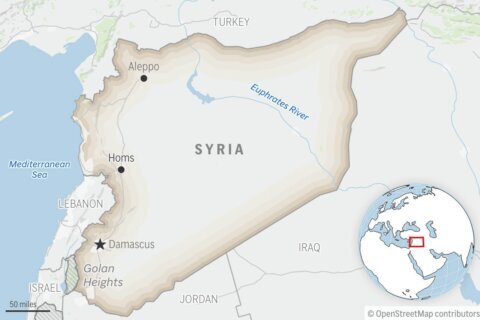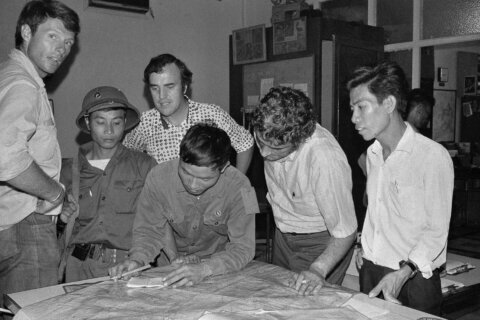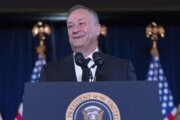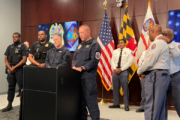Dr. Anthony Fauci misses the “boring” stuff — like going out to dinner, seeing a movie and lunchtime runs near the National Institutes of Health campus in Bethesda, Maryland.
As a chief adviser in the country’s response to the coronavirus pandemic, Fauci doesn’t have much free time these days. He spends the first part of his 16-hour workday leading vaccine and therapeutics research at the National Institute of Allergy and Infectious Diseases, the $5.9-billion arm of the NIH that he’s directed since 1984. He usually then heads to the White House for meetings with staffers, Vice President Mike Pence and other members of the coronavirus task force.
“I’m in a strange world here,” he says. “I’ve devoted my entire career — which is, you know, 85% of my life — to infectious diseases, and now I’m caught in a historic pandemic.”
The born-and-raised New Yorker, 79, is known as a straight talker who’s skilled at communicating complex science to policymakers and the public, and he’s become perhaps the country’s single most authoritative scientific voice on COVID-19. A recent Quinnipiac University poll placed Americans’ trust in Fauci above that of President Donald Trump and the Centers for Disease Control and Prevention on matters related to the virus.
Fauci has advised every president since Ronald Reagan and has worked on a host of viral outbreaks, including the HIV/AIDS epidemic, bird flu, H1N1 swine flu, Zika and Ebola. The swine flu, he says, “spread like wildfire, but it was a wimpy virus.”
He also helped create the President’s Emergency Plan for AIDS Relief, a program credited with saving some 18 million lives globally since its launch in 2003, and in 2008, President George W. Bush awarded Fauci the Presidential Medal of Freedom. Five years ago, he helped treat two U.S. Ebola patients, in part “to show his staff that he wouldn’t ask them to do anything he wouldn’t do himself,” Science Magazine reported.
So the career civil servant isn’t new to viral outbreaks and public health emergencies. And he’s long warned that the U.S. would likely see another infectious disease crisis during his lifetime.
His prediction has, of course, been realized.
[Read: Dr. Peter Hotez Combats Antiscience While Working on a Coronavirus Vaccine.]
Fauci’s Worst Nightmare
“What (kept) me up at night is the emergence, usually jumping from an animal reservoir to a human, of a brand new virus that no one has ever seen before,” Fauci says of his decadeslong career working on infectious diseases. Enter COVID-19, which meets a third criteria: It can be deadly. “Bingo,” he says. “The worst nightmare comes true.”
Fauci learned to prepare for the unexpected while working on the HIV/AIDS epidemic in the ’80s because dangerous outbreaks “generally don’t start off telling you how bad they can be,” he says. He first took note of what would become a global epidemic after reading an early report that described a pneumonia-like condition that had cropped up among a handful of gay men in Los Angeles in 1981.
Within 5 years, he created an AIDS division at NIAID, and he later pushed to loosen HIV-drug clinical trial requirements to allow patients to try multiple experimental treatments at once.
Fauci also met his wife, Christine Grady, at the NIH, where she leads its clinical center’s bioethics department. Throughout the pandemic, she’s been his “very smart and very prudent” support system, he says: Grady reminded him to sleep, eat and drink water “when New York was kind of on fire” and he became all-consumed by COVID-19 this spring.
The pair run or power walk together in the evenings, their way of holding on to some semblance of a “normal existence.”
“I’m pretty good at compartmentalizing,” Fauci says.
[Read: Hospital Heroes Step Up to COVID-19.]
Clashing Perspectives
It’s a skill that’s surely been useful during the COVID-19 crisis. Fauci’s blunt assessments of the U.S. response to the pandemic have often been at odds with those of the president and his supporters, who have painted a rosier picture. In a recent address in the Rose Garden, Trump repeated an incorrect claim that increased testing is driving the surge in cases, and said his administration’s efforts have potentially saved 2 to 3 million lives.
In contrast, Fauci is not one to sugarcoat. “I do tell the truth, and I do say it like it is, even when people don’t want to hear it,” he says. When asked whether he’s assigned too much personal credit — or blame — for the country’s handling of the pandemic, Fauci says “there’s not much credit to be given out. We have a serious problem, so if people start taking credit now, they’re really doing a premature dance.”
Efforts to undermine Fauci’s credibility appear to have escalated recently, a development he calls “bizarre.” Recently, a White House official anonymously circulated a list of Fauci’s statements early in the pandemic, which changed as officials learned more about the virus. On July 15, USA Today published an op-ed by White House trade adviser Peter Navarro that sharply criticized Fauci; Navarro was in turn rebuked by Trump and Mark Meadows, his chief of staff.
The political drama, Fauci says, is “the garbage that’s going on” in the background of his work on infectious diseases like COVID-19, and while “obviously, it can be exasperating,” he tries to ignore it. He has no plans to leave his position as NIAID director — “Why the hell would I?” — and says he will stay on the White House’s coronavirus task force as long as he thinks he “can do more good from within than from without.”
The medical community and lawmakers defended Fauci last week, and Senate Majority Leader Mitch McConnell (R-Ky.) said July 15 he had “total” confidence in the doctor. But Fauci says the public turmoil in recent months has taken a toll on his personal life: He’s had armed security and says people have harassed his wife and three daughters, including by tapping into their phones and sending them letters.
“I mean, come on,” he says. “That’s ridiculous.”
[Read: Meet the Woman Behind the World’s Most Famous Coronavirus Tracker.]
Cult of Personality
It’s a sharp divergence from the pop culture fandom that sprung up around him this spring, which produced a petition to name him People magazine’s Sexiest Man Alive, a portrayal by Brad Pitt on Saturday Night Live and merch with slogans like “In Fauci We Trust.”
“You know, people are buying bobbleheads about me, and on the other hand, people are threatening my life — it’s a very bizarre situation,” he says. “I’ve become more of a symbol, but that’s not really me.”
If Fauci is, in fact, a symbol of what’s right or wrong about the U.S. response to the pandemic, he’s likely to remain one for some time. In just six months, the virus has infected more than 3.7 million people and killed more than 140,000 in the U.S. alone. Since July 5, 25 states have shattered their single-day records for new cases, according to the COVID Tracking Project.
As cases have picked up again, so has Fauci’s work pace, shoving any thought of “the normal day-by-day things” that he misses into the far distance.
“It’s kind of (like) your life is in suspension. I’ve never had that feeling in my life before,” he says. “But I’m caught up in the COVID-19 web, you know? That’s my world. That’s my entire world.”
More from U.S. News
What Are the Symptoms of Coronavirus?
Coronavirus Prevention Steps That Do or Do Not Work
Dr. Anthony Fauci: Fighting the Coronavirus Pandemic ‘Is My Entire World’ originally appeared on usnews.com

